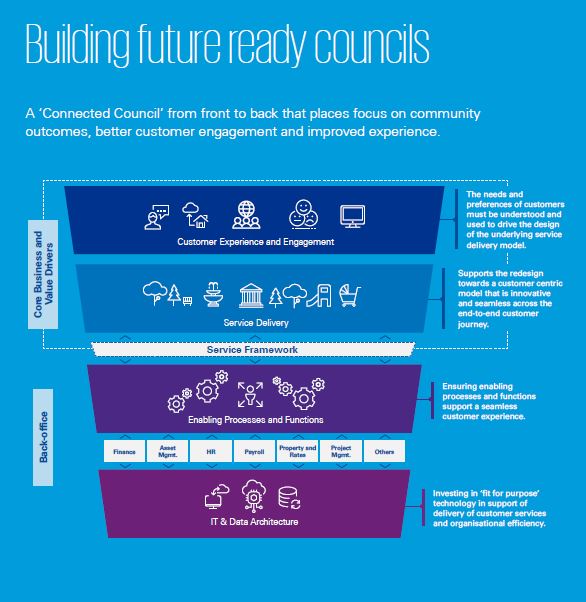Only three per cent of local governments consider themselves to have fully transformed customer experience through ICT, a survey has found.
The biggest challenge to transformation is a lack of skill, leadership and resources, the Customer and technology transformation in local government report by KPMG and the Public Sector Network found.
Difficulties sourcing ICT vendors and procurement partners were also cited as obstacles to success.
“Councils realise they are confronting increased customer expectations, which means a complete rethink in many cases, of the way they operate,” the report released this month says.
It says successful delivery of a transformation program calls for a wide range of unique skills across a variety of disciplines, including project management, change management, customer experience design, data migration and systems analytics.
“No single council has all these skills to hand, nor does local government have a lot of free capacity or funding to release existing resources full time,” the report says.
Relevance or redundancy
Toni Jones, Partner and Local Government Lead at KPMG Enterprise says resource constraints were a major issue to emerge among the local government leaders surveyed.

“The key things coming out were resources – in terms of resource constraints based on the financial resources, but also capability and skills for the future,” she told Government News.
“Leadership also came out, in terms of how do you ensure you’ve got the top level leadership that’s helping to drive the change?”
The technology market has been quite narrow, she said, with a lower level of investment in technology over the last 10-20 years and a relatively small number of vendors for the systems that have traditionally serviced local government.
“There’s a perception out there that there’s not much choice,” she says, although she adds this is changing as more new products come in and the technology develops.
Ms Jones said the imperative to improve efficiency and give customers the service they are demanding through digital transformation goes to the heart of what local government is all about.
“It’s very much about what is the relevance and sustainability of local councils,” she says. “It’s a question of how do we maintain the really important function of being the closest government to the community? If we can’t operate our businesses in a really modern way that responds to the customer and in a financially sustainable way, what is the relevance of these organisations?
“If they don’t modernise and become more financially sustainable does state government take more away from them? Do they amalgamate?”
Neglecting the ‘middle layer’
KPMG surveyed attendees at the PSN’s recent LG Transformation series, which was delivered across six Australian cities and NZ and focused on increasing efficiencies and customer satisfaction in local government.
Based on 228 responses, a “concerning” seven per cent of councils had not started on the path to transformation, a third were developing strategies, 20 per cent were in business case development and almost 40 per cent were in operational rollout.
Only three per cent could say they had totally transformed operations.
“Councils realise they are confronting increased customer expectations, which means a complete rethink in many cases, of the way they operate,” the report says.
The figures showed that many councils were making progress – for example putting transactions online, digitising forms and changing payment methods.
However, in many cases this is experienced only at the customer end and not integrated all the way to the back office, and one in three hadn’t tackled the ‘middle layer’.
“One third of councils have still not tackled the ‘middle layer’components such as integration layers, data warehouse or payments platform, all vital components to a successful transformation,” it said.
“Nevertheless, a holistic integration of back, middle and front end components must take place to make a significant step change in transformation.”

Almost all those surveyed put customer experience, digitisation and modernising technology at the top of their transformation program, including adopting sophisiticated data analytics to capture customer information.
However the most important element of transformation must come from the top, the report said.
“Fundamentally, changes are all about people, and without the right leadership and the right skills to support the change and deliver in the new world, all transformation will be a challenge. Leadership from the top, including the influence from the elected body, is critical for enabling and supporting this change.”
Comment below to have your say on this story.
If you have a news story or tip-off, get in touch at editorial@governmentnews.com.au.
Sign up to the Government News newsletter





Leave a Reply